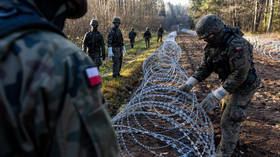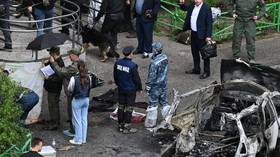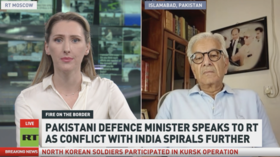Poland takes Wagner threat ‘seriously’ – top senator

Any Wagner fighters crossing from Belarus will be met by both Polish and American troops, the deputy marshal of the Polish senate, Michal Kaminski, told Ukrainian media on Monday.
Several thousand Wagner members moved to Belarus over the past month, under the deal that ended their failed mutiny against Moscow. Worried about an “invasion,” the government in Warsaw has announced nearly doubling the size of its army, from 172,000 to 300,000 troops.
“No one in Poland excludes that in order to, so to speak, test NATO, test the solidarity of the alliance with Poland, with Eastern Europe, they may try to enter Poland,” Kaminski said in a TV telethon, describing the hypothetical incursion as a “terrorist operation rather than a full-scale invasion.”
He was confident, however, that NATO could handle the threat easily, according to the Ukrainian outlet Strana.
“I want to remind you that we already have American soldiers and officers in Poland. Let the Wagnerites come in. They will meet not only Polish, but also American defenses,” Kaminsky said, predicting they will be sent back to Russia “in coffins.”
Kaminski is one of the four deputy marshals in the upper house of the Polish legislature. His party, the Union of European Democrats, has only one seat apiece in the Senate and the Sejm. However, his position on the Wagner Group does not differ from that of Prime Minister Mateusz Morawiecki.
In a speech on Saturday, Morawiecki voiced concern over the presence of “more than a hundred” Wagner members in Grodno, near the so-called Suwalki Gap, which separates Belarus from the Russian territory of Kaliningrad.
He described the arrival of the group as “undoubtedly a step towards an upcoming hybrid attack on Polish territory,” and speculated they could infiltrate Polish territory by pretending to be illegal immigrants, or pose as Belarusian border guards to help illegal immigrants enter Poland.
Visiting Russia earlier this month, Belarusian President Alexander Lukashenko quipped that the Wagnerites were getting restless and wished to “go on tour” of Poland, which serves as a hub for the NATO effort to supply Ukraine with weapons, equipment and ammunition.
Lukashenko helped negotiate the end to the mutiny by Wagner chief Evgeny Prigozhin at the end of June, which briefly saw the private military company turn its guns on the Russian military. Prigozhin himself agreed to go into exile in Belarus, but was allegedly spotted at the Russia-Africa Summit in St. Petersburg last week. Wagner, which technically doesn’t exist under Russian law, has substantial security contracts on the African continent.














